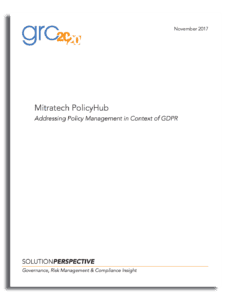The Effect of Brexit on Legal, Risk and Compliance
Some of the legal and compliance effects of Brexit on businesses in the UK are well-understood and have been well-documented.
For example, the UK has signed up to GDPR and this regulation will continue to be included in UK law once (or, maybe I should say, if) the UK leaves the EU. The latest incarnation of the EU’s AML directive is also already enshrined in UK law and is highly unlikely to be revoked before it formally comes into force in January 2020. Corporations’ obligations around Rome I and Rome II Regulations (which address contractual and non-contractual obligations respectively), again, should remain largely unchanged on exit day.
No seat at the EU table?
What is certainly up for debate, though, is how much influence the UK will have on new EU regulations that are created in the future or on changes to existing regulations that we are currently signed up to. Some believe that the UK will continue to work alongside the EU regulation and law setting teams (as we do very effectively with other, similar bodies around the world), while others push forward the view that once we are out, we have no seat at the table, so our ability to influence will be severely diminished or disappear altogether.
When will Brexit actually happen?
Most of the Brexit-related issues facing UK businesses today revolve around the lack of clarity of everything to do with the process. We have, so far, missed two seemingly drop-dead leaving dates and, despite being almost 3 years out from the referendum, there is absolutely no certainty around what an exit will look like and what it will mean in terms of the everyday legal and regulatory trading and other relationships that the UK has with EU member states, or indeed, many other countries around the world.
Having said that, most businesses have been planning, to some extent or other, for the prospect of the dreaded no-deal exit from the EU. Many have been already looking at how their operations would need to change based on the possibility that either the PM’s withdraw agreement, a potential Customs Union, Common Market 2.0 or other components of potential exit plans that have been muted over the past couple of years actually come into effect.
Change is part of the normal business landscape
In a sense, the uncertainty being faced today, is just another example (albeit, an extreme example!) of why many businesses have needed to adopt the mindset that they have over recent years. They are used to being exposed to a vast amount of regulatory change. Change is just part and parcel of the normal business landscape that has existed for corporations for quite some time. Those that are best equipped to manage these changes and have proven track records of successfully navigating their operations and remaining compliant over recent years will, no doubt, be the ones most successful at reacting to whatever deal we finally exit the EU with and, perhaps as importantly, be amongst the first to gain a commercial advantage.
The point around commercial advantage is key. As with all areas of compliance, the focus of today’s successful businesses has been, not simply remaining compliant in the face of the headwinds of a vast amount of regulatory change, but about doing so in ways that provides them with a steal on the opposition. This has been achieved either through the speed at which they are able to pivot their operations or by the innovative ways they are able to take advantage of the changes.
I love the analogy of Formula 1 racing. In that sport, every year, teams are faced with new regulations aimed, often, at slowing cars down and improving safety, but the teams’ cultures of relentless innovation allows the more successful of them to find paths through that regulation, remain compliant and, yet, year on year, produce ever-faster, more competitive cars.
In many ways, I don’t see the inevitable legal and regulatory changes that will accompany Brexit to be any different. The most successful businesses will be the ones that can adapt quickly to the changed regulatory, legal and competitive landscape, find the ways to gain commercial and market advantages and come out even better than before.





